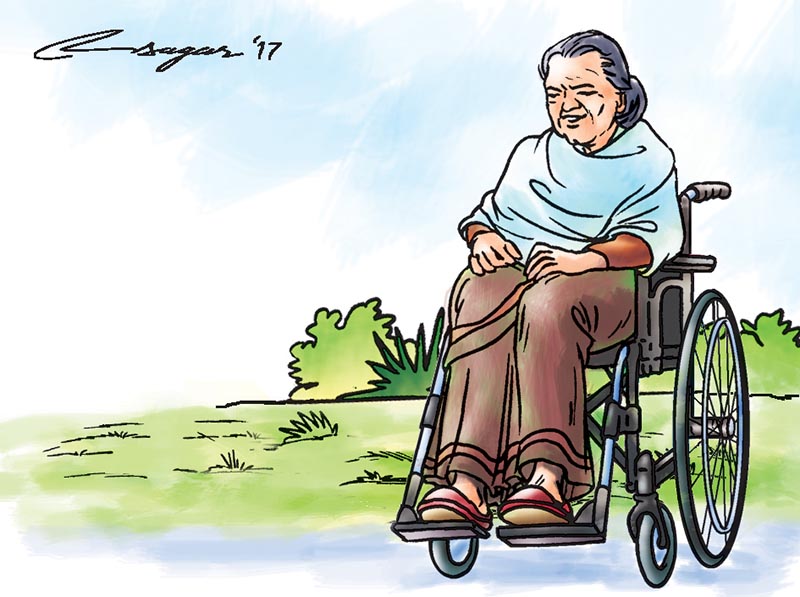Advocacy services: Tool for change
Advocacy is an effective tool for protecting and enforcing the rights of persons with disabilities. Advocacy services can advance various missions from correcting unlawful abuses of individuals to empowering persons with intellectual disabilities and psycho-social disabilities
Originally, having a disability meant having fewer, more limited or more truncated rights than other classes of people. The persons with disabilities are not fully protected by the law in developing countries. The law and tradition prevent them from meaningful exercise of human rights. When someone has a disability it entails that the individual does not own normal opportunity, autonomy and respect.
In most of the developing countries, including Nepal, the principle of normalization is not included in government policy. The unnecessary dividing lines are drawn between persons with disabilities and others with regards to medical or social treatment, condition for growing up, education, employment or welfare.
Advocacy is an important tool that can assist people with disabilities to stand in a position and support those who wish to assert their rights. Advocacy means speaking up for the right of those people who are being treated unfairly. Advocacy is a potential mechanism that enables people with disabilities to seek and receive information, explore and understand their options known to others. It is a key to empower people with disabilities especially people with intellectual disabilities to make decisions for themselves and ensuring their rights are respected by others. The need for provision of advocacy to assist people with disabilities to access, develop and maintain responsive services has been identified as a critical component of successful implementation of the right of persons with disabilities to legal capacity, and to live independently in the community.
Long-standing barriers to enjoyment and exercise of these rights especially by people with intellectual disabilities and psycho-social disabilities make the need for advocacy services at both individual and systemic barriers an essential component of a reform process. Various studies have pointed to the need for advocacy at a number of levels. These are self-advocacy development and peer network development among people with intellectual and psycho-social disabilities to assist people develop a vision, voice and confidence for self-empowerment and mutual support in advancing their rights to legal capacity and living in the community.
It is also the development of advocacy leadership among families who have children with disabilities – to support the independence and right to decide among their family members with disabilities; and the provision of individual advocacy services to assist individuals in negotiating decision-making processes related to property, personal life decisions and health care decisions; and systemic advocacy services to monitor, track and report on system implementation and progress to advance the rights to legal capacity and living independently in the community. Self-advocacy is a tool to enable people with intellectual disabilities and psycho-social disabilities to speak out; to have a voice; and to have the means by which their voice may be heard. Self-advocacy organization means: speaking for yourself; standing up for your rights; making choices; being independent and taking responsibility for yourself. Self-advocacy in practice, often means advocacy in a group, ‘speaking up with and for other people with intellectual disabilities and psycho-social disabilities.’ It has been seen as part of the struggle of marginalized people for equality, equal rights and citizenship.
In addition, self-advocacy in a group is essential to shift the balance of power between people with intellectual disabilities and psycho-social disabilities and the people close to them such as parents and staff.
Self-advocacy is also about identity. In contrast to normalization where the emphasis is on conformity and denial of difference, people in self-advocacy groups are more likely to acknowledge their identity as people with disabilities.
Internationally, disability issues hardly reached the agenda until the 1970s and even then, the efforts were tentative. The Universal Declaration of Human Rights (UDHR) 1948 article 25 states that people have a right to an adequate standard of living, even if they are disabled. The United Nations Convention on the Rights of Persons with Disabilities (UNCRPD) is the first legally binding human rights instrument of the United Nations that explicitly protects the rights and dignity of persons with disabilities. The Convention adopts a social model of disability through its recognition that disability results from interaction between a non-inclusive society and individuals. Indeed, the Convention is a paradigm shift in approaches to persons with disabilities who are not viewed as ‘object of charity’ but rather as ‘subjects’ with rights who are capable for raising voices to achieve rights and making decisions for themselves based on free consent.
Thus, advocacy is an effective tool for protecting and enforcing the rights of persons with disabilities. Advocacy services can advance various missions from correcting unlawful abuses of individuals to empowering persons with intellectual disabilities and psychosocial disabilities. The adoption of CRPD is considered as the dawn of a new era- an era in which persons with disabilities will no longer have to endure the discriminatory practices and attitudes that have been permitted to prevail for all too long.
Joshi is a disability rights lawyer






